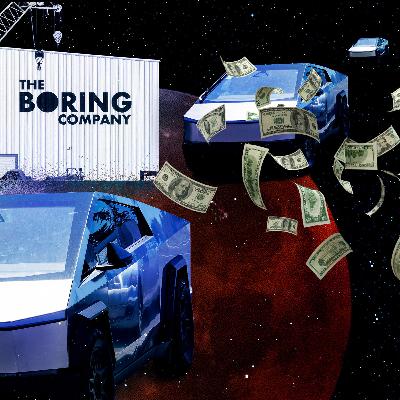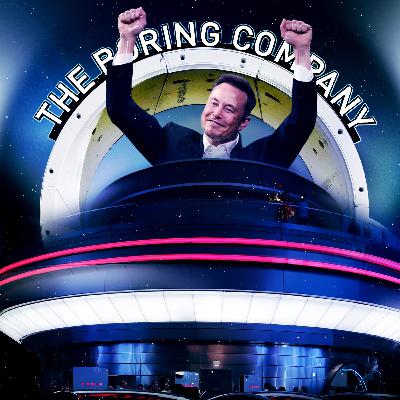Discover Elon, Inc.
Elon, Inc.

Elon, Inc.
Author: Bloomberg
Subscribed: 415Played: 16,816Subscribe
Share
2025 iHeartMedia, Inc. © Any use of this intellectual property for text and data mining or computational analysis including as training material for artificial intelligence systems is strictly prohibited without express written consent from iHeartMedia
Description
Elon Musk’s sprawling business empire has granted the billionaire a degree of power and global influence that transcends the industries he’s reshaped. He is the leader of no fewer than six hugely influential companies, spanning electric vehicles to wartime communications, and their innovations could shape the fates of nations.
Musk is polarizing, confounding and inescapable. And he is the biggest business story of our time.
Each week, listen in as host David Papadopoulos convenes a panel of Bloomberg Businessweek journalists who are tracking Musk’s companies and the surprising ways they intersect. They break down the business mogul's latest moves and analyze what they could mean for us all.
144 Episodes
Reverse
Make sense of the world with one essential conversation, every week. Mishal Husain, one of Britain's best interviewers, brings her signature blend of curiosity and tenacity to weekly conversations with world leaders, business titans, and cultural icons, revealing who they really are and how they see the world changing around them.Follow the podcast wherever you listen, so you don't miss an episode.https://link.podtrac.com/iu94w2n4See omnystudio.com/listener for privacy information.
On this week's Everybody's Business, Stacey Vanek Smith and Max Chafkin discuss a possible return of DOGE-like cuts due to the shutdown, the wild ride of crypto entrepreneur Justin Sun and a very surprising economic indicator.See omnystudio.com/listener for privacy information.
In the latest episode of Everybody's Business, Elon, Inc.'s own David Papadopoulos visits Max Chafkin and Stacey Vanek Smith to explain the roller coaster ride that is Argentina's economy. Also on the menu: the UN, MrBeast, David Ellison and a new, depressing office trend. Subscribe to Everybody’s Business wherever you get your podcasts!See omnystudio.com/listener for privacy information.
As promised in Tuesday's episode, Everybody's Business will carry the Elon, Inc. banner moving forward. In the latest episode, Max Chafkin and Stacey Vanek Smith discuss a plane crash carrying illicit cargo with a SpaceX twist, fed independence and salary caps in sports. Subscribe to Everybody’s Business wherever you get your podcasts!See omnystudio.com/listener for privacy information.
This is the final episode of Elon, Inc., and it comes at a fitting point in the story of the highly controversial entrepreneur Elon Musk. The podcast was launched around the time the South Africa native bought and rebranded Twitter, transforming a mainstream social media platform into something else entirely. Now, the podcast has found a natural conclusion with his full return to his companies, his exit from the Trump administration and the unprecedented governmental upheaval, mass firings and grim global consequences left in his wake.To reflect on this tumultuous timeline, David Papadopoulos gathers the best and brightest Elon Musk experts the Bloomberg newsroom has to offer—including Bloomberg Businessweek’s Max Chafkin and Bloomberg News Musk reporter Dana Hull, technology reporter Kurt Wagner and editor Sarah Frier—to go through the most memorable Musk stories from the past few years and to peek into the future of Musk’s empire and potential political ambitions. Among the stories we discuss are Musk’s outburst directed at advertisers at the New York Times DealBook summit, that time when Musk and President Donald Trump were hawking Teslas from the White House driveway and the right-wing multibillionaire’s “awkward hand gesture.” But in the end, is there any story that can top the rise and fall of the Musk-Trump friendship? Probably not. Musk spent hundreds of millions of dollars getting the Republican back in the White House, but their partnership didn’t make it past the summer. As Chafkin says, “that was obviously the Elon feud to end all feuds.” When it comes to looking forward, speculation abounds, but one thought in particular wins the group’s approval: Hull’s prediction that the South Africa native will one day make good on his promise to open a candy company. As the Elon, Inc. podcast rides into the sunset, future Musk coverage will find a home on the new Bloomberg podcast, Everybody’s Business, co-hosted by Stacey Vanek Smith and Chafkin.See omnystudio.com/listener for privacy information.
What do you give a man who has everything? $1 trillion of course. The news broke Friday that despite a seemingly waning interest in making cars and his alienation of many of Tesla’s customers, Elon Musk was offered a record-busting payday by the carmaker’s board. The catch? The South Africa native and richest person in the world (even before the $1 trillion) has to help the embattled automaker meet certain goals when it comes to company value and product development. In this episode of Elon, Inc., host David Papadopoulos gathers Bloomberg Businessweek’s Max Chafkin and Bloomberg News Elon Musk reporter Dana Hull to discuss the new pay package, its stipulations (such as growing Tesla’s market value to $8.5 trillion and delivering 1 million robots in ten years) and how likely it is that investors will approve the payout. Speaking of the Nov. 6 shareholder meeting, the crew is also joined by Bloomberg tech reporter Kurt Wagner to discus another investor matter: whether Tesla should invest in Musk’s artificial intelligence startup xAI (the conflict of interest practically writes itself). Also of note is the idea that a company like Tesla that’s increasingly turning to AI would invest in another AI company. Wagner tries his hardest to explain the situation and adds a substantial caveat: according to the proxy, the shareholder vote won’t be binding. See omnystudio.com/listener for privacy information.
Labor Day is generally a slow news day in the US. But this year it happened to be the day Elon Musk chose to unveil Tesla’s “Master Plan, Part 4.” Since its first installment in 2006, the electric vehicle-maker’s future roadmap has been seen by some as a big part of the company’s identity. The latest version comes at a critical moment for the company. With Tesla sales down in many markets, tepid interest in new models and high-profile controversies often stemming from its voluble CEO, his right-wing politics and association with Donald Trump—the stakes are high. In this week’s episode of Elon, Inc. Max Chafkin invites Bloomberg automotive editor Craig Trudell and Elon Musk reporter Dana Hull to discuss the document and the state of Tesla. Most noteworthy in the report they say is a newfound focus on robots, specifically the humanoid autonomous Optimus model. As a matter of fact, Musk himself followed up on X and claimed in his usual hyperbolic fashion that around “80% of Tesla’s value will be Optimus.” But what about the cars? Trudell says he remembers the priorities around the previous big Tesla plan in 2023 (a year before Trump was re-elected) and how they have changed. “Right around that time, this was a company that was all about sustainable energy,” Trudell says. Now “it’s all about AI, it’s all about robots, it’s all about self-driving cars.” Hull takes things a step further and pinpoints what she says is a potential weak point for the company: “I think that Tesla has a real marketing problem where you have a CEO who is clearly bored of the car industry.” But more broadly, regarding the question of whether the company will be able to turn it’s struggling car business around, Chafkin has a theory. “It feels like there’s a little bit of an effort, maybe even a deliberate effort underway to untangle Elon from the future of Tesla,” he says.See omnystudio.com/listener for privacy information.
On this week’s edition of Elon, Inc., Bloomberg editor Sarah Frier sits down with Elon Musk reporter Dana Hull to discuss the latest news from the world’s richest man. They start with what was arguably the most dramatic development: X and Xai’s lawsuit alleging that Apple has unfairly favored artificial intelligence giant OpenAI in its app store. Hull says she isn’t convinced that it’s a matter of collusion, though. “It’s because ChatGPT is the most popular chat bot and Grok is not,” she says “Even though Elon keeps promoting Grok on X, like, most people don’t use it.” Speaking of OpenAI, the duo also discuss the news that Musk once courted Mark Zuckerberg as a partner to purchase Sam Altman’s AI rival. The deal was rejected by OpenAI but Hull and Frier address the question on everyone’s mind: weren’t the two tech billionaires supposed to be involved in a cage fight a few years ago? Finally, they focus on Ani, the new “digital companion” from Grok. Last week, Musk posted quite a bit about this suggestively dressed anime-style avatar, available for paid subscribers. Meant to spice up the user experience, can the product make waves outside a very specific demographic? Hull believes it might play into Musk’s idea of “unregretted user minutes” and that users who “develop a relationship with an online avatar” might find themselves spending quite a few minutes on the platform.See omnystudio.com/listener for privacy information.
In this week’s episode of Elon, Inc., we conclude a series of “jealousy interviews” where we talk to authors of Elon Musk stories we wish we had written. This time, Bloomberg News Musk reporter Dana Hull chats with Kirsten Grind of the New York Times about her May exposé on the alleged campaign trail drug habits of a certain entrepreneur-turned-aspiring political kingmaker. The conversation covers not only Musk’s reported drug use (which he has denied) but the prevalence of drugs in Silicon Valley and across the tech industry as well. “All these tech guys think they can disrupt everything and they want to also disrupt their health,” Grind says. “So they kind of think they can medicate themselves a lot of the times.” Hull and Grind also talk about the broader themes of Musk’s salad days, back when he juggled not only a grueling schedule but private legal battles involving his many children.See omnystudio.com/listener for privacy information.
Elon Musk left Washington and his “Department of Government Efficiency” initiative with a highly controversial and, many would say, disappointing track record. For followers of President Donald Trump and the idea of slashing what he’s claimed is out-of-control government spending, Musk’s self-reported $199 billion in savings (which cannot be independently confirmed) is a far cry from the $2 trillion the Tesla CEO promised. As far as Musk’s detractors are concerned, his cuts—often executed in haphazard fashion as his twenty-something minions unceremoniously fired long-serving federal employees—have not only disrupted how the government operates on a fundamental level, but also triggered dramatic downstream consequences, many irreversible, both domestically and across the globe. In this episode of Elon, Inc., Max Chafkin sits down with Wired magazine senior writer Makena Kelly to discuss the legacy Musk leaves behind in Washington. How do you make sense of the hundreds of thousands or people estimated to have already died in Africa and elsewhere because of Musk’s gleeful dismantling of USAID? Or how the supposed savings of “DOGE” compare to the $3.1 trillion recently tacked on to America’s $37 trillion national debt by Trump’s “Big Beautiful Bill”? And what are the consequences for the country now that Musk has upended the lives and morale of those federal workers who remain, many of whom still work under the shadow of more firings? For Kelly, Musk’s lasting legacy will be one of cultural shakeup: Many of the people he and Trump have placed in positions of power say they think the federal government should be run more like a tech startup than a traditional bureaucracy. And even though he’s physically absent, they still don’t want to fall out of favor with the world’s richest man. Finally, Kelly outlines what she says we can expect from “DOGE 2.0.” See omnystudio.com/listener for privacy information.
It was an expensive week for Tesla. On Friday, a jury in Miami found the electric car company 33% to blame for a deadly 2019 crash involving its full self-driving feature, ordering it to pay a total of $242.5 million in damages. A few days later, the company’s board said it would dole out a $30 billion stock payoff to co-founder Elon Musk in order to keep him focused on the company, which has been bouncing from crisis to crisis. In this episode of Elon, Inc., host David Papadopoulos is joined by Bloomberg Elon Musk reporter Dana Hull, Bloomberg Businessweek’s Max Chafkin as well as Missy Cummings, an academic and former senior adviser for safety at the US National Highway Traffic Safety Administration who was called as an expert witness during the trial. Together, they discuss the possible consequences for the company flowing from the verdict, with Cummings warning it’s yet another roadblock for fully self-driving cars. Papadopoulos, Hull and Chafkin also discuss that monster payout to Musk. Later, Papadopoulos, Chafkin and Bloomberg News reporter Kiel Porter discuss Porter’s latest story on The Boring Company, Musk’s largely stalled endeavor to build underground “hyperloops.” Although the tunnel-digging venture recently scored a contract to build a loop connecting Nashville’s airport with its downtown, Porter’s paints a picture of a struggling company that—in true Muskian fashion—promises more than it can deliver. And the challenges are mounting. All the company has to show for its labors is a small loop that takes people to and from the Las Vegas Convention Center. When asked by Papadopoulos about the company’s falling valuation—now hovering at around $6.4 billion, down from a high of $8.6 billion in July 2023—Porter is direct. “They were supposed to have 68 miles dug in Vegas. It was supposed to be this huge interconnected lattice, and instead you got less than four operational miles,” he says. “It doesn’t take a genius to look at that and go, ‘why am I investing in this?’”See omnystudio.com/listener for privacy information.
The growing blowback from years of spreading conspiracy theories, embracing far-right political causes and attempting to dismantle the US government (with calamitous results for millions) might have finally taken its toll on Elon Musk and his companies. Or perhaps not. Last week’s Tesla earnings call ended on a somber note, with world’s richest man declaring his struggling and divisive electric car company could have “a few rough quarters” ahead. With revenue down 12% and the political climate for electric vehicles darkening courtesy of his former boss in the White House, who can blame him? But nothing is ever absolute when it comes to the world’s most famous living native of South Africa. Mere days later, Tesla announced a new $16.5 billion chip deal with Samsung, and over the weekend a now-jolly Musk proclaimed in his usual hyperbolic manner that Tesla might rake in $30 trillion per year from sales of its humanoid robot (yes, with a T). Oh, and on July 21, Tesla opened its first diner in the heart of Hollywood. Alongside a $9 grilled cheese sandwich and a contentious, four-story movie screen, protests immediately followed. On this week’s episode Max Chafkin discusses all the latest Tesla news with Bloomberg’s Elon Musk reporter, Dana Hull. The duo also welcome Bloomberg health reporter Ike Swetlitz to hear about the latest from Neuralink, Musk’s brain implant company. In the spirit of Musk’s dreams of robot trillions, that company proclaimed it expects $1 billion in annual revenue by 2031, with chips inserted into 20,000 brains annually. Currently, the number is nine. But maybe a bionic eye will prompt second looks. Also, Chafkin and Hull take a look at the latest news from Musk’s tunnel company Boring, which just scored a deal to drill a passage in red state Tennessee, from downtown Nashville to the city’s airport. If history is any guide, there might be a hiccup or two. See omnystudio.com/listener for privacy information.
On this week’s episode of Elon, Inc., host Max Chafkin and Bloomberg News reporter Ed Ludlow discuss their cover story for the latest issue of Bloomberg Businessweek. Their reporting details the ways in which Elon Musk’s companies—specifically Tesla, SpaceX and xAI—are struggling in the wake of his feud with President Donald Trump. Chafkin and Ludlow break down where each of these companies stands now, and analyze how investors are rationalizing their continued investments in the multibillionaire’s sprawling endeavors. Then Bloomberg News technology editor Sarah Frier takes over the hosting chair to interview Wall Street Journal reporter Dana Mattioli about Musk’s many offspring, including his custody agreements and pro-natalist leanings. The conversation is the second in a summer series in which our Elon, Inc. panelists interview Musk reporters from outside Bloomberg about stories we wished we wrote first. Mattioli explains Musk’s stated desire to populate Mars and further populate Earth, how he’s using his social media platform to recruit mothers and why observers think it’s likely he has more than the 14 kids that are publicly known. She also digs into how Musk’s fixer Jared Birchall has interacted with the mothers of Musk’s children, including Ashley St. Clair, whose public child support battle with Musk shed light on Birchall’s tactics.See omnystudio.com/listener for privacy information.
On this week’s episode of Elon, Inc., host Max Chafkin and Bloomberg News reporters Dana Hull and Kurt Wagner chat about Elon Musk’s artificial intelligence company, xAI. The endeavor just debuted its new Grok 4 model on the heels of an antisemitism controversy, but Musk sees a brighter future for his creation, claiming it might discover “new physics” one day. Before that happens, though, the buzziest feature of the model is its AI companions—including a pigtailed and corseted anime character. Musk introduced Grok 4 as news dropped that one of his other companies, SpaceX, would invest in xAI, and that another company he happens to run, Tesla, might follow suit (pending a shareholder vote). Our guests discuss what exactly it means when a rocket company and a car company invest in another company that’s making AI girlfriends, especially when all those companies happen to be run by the richest man in the world. Then Wagner takes over the hosting chair to interview New York Times reporter Teddy Schleifer about the role Musk and his Silicon Valley billionaire pals have played in building the Trump administration, starting before the Republican took office. The conversation is the first in a summer series in which our Elon, Inc. panelists interview Musk reporters about the stories we’re jealous we didn’t write first. Schleifer recounts the weeks following Election Day last year, when Musk embedded himself at Trump’s home at Mar-a-Lago in an effort to influence the future president’s plans. As candidates for top cabinet positions began swinging by the Florida club, they found themselves seated across from Musk’s loyal aides. Wagner and Schleifer also discuss the constantly evolving relationship between Musk and Trump, and whether Musk will still be involved in politics when the year comes to a close.See omnystudio.com/listener for privacy information.
The day after Grok started spewing antisemitic propaganda, X CEO Linda Yaccarino announced that she's leaving the company. The timing sticks out, although sources says she's been planning an exit for a while. In this emergency episode, Max Chafkin summons Bloomberg's big tech team leader Sarah Frier to chat about Linda's legacy, her possible future plans and the timing of her departure.See omnystudio.com/listener for privacy information.
On this week’s episode, David Papadopoulos invites Bloomberg political reporter Nancy Cook and Bloomberg Businessweek’s Max Chafkin to the studio to discuss Elon Musk’s latest idea—the creation of the “America Party.” Third parties have famously been losing propositions in American politics, and Cook questions if the distractible multibillionaire even has the patience to handle the paperwork required to register with the Federal Election Commission. And then there’s his constant string of controversies. Chafkin wonders if there’s a reliable base out there hungry to support the party of a man who called Social Security a Ponzi scheme, initiated a feud with President Donald Trump (still popular with much of Musk’s theoretical rank and file) and whose “DOGE” initiative on Trump’s behalf is accused by some of worsening the catastrophic consequences of the recent flooding in Texas. Nevertheless, history shows just how disruptive third parties can be when the margins are slim, as they are now. Cook sees a small slice of the electorate, “tech bros who are like, ‘oh, right, we should cut Social Security, we should shrink the federal government’,” who could possibly be converted by the right wing business mogul. Later in the show, Papadopoulos and Chafkin are joined by Bloomberg stocks reporter Esha Dey to discuss the latest gyrations of the world’s most prominent meme stock, Tesla. The trio discuss the challenges facing the electric car company and dissect a recent eyebrow-raising note from analyst Dan Ives. The prominent Tesla bull presents a simple answer to Tesla’s woes: give Elon more money.See omnystudio.com/listener for privacy information.
The predictable second round of Elon Musk’s feud with Donald Trump began over the weekend as the Tesla CEO took aim at the GOP’s massive tax-and-spend bill. Specifically irking Musk (along with efforts to gut incentives to buy his cars) is the amount of money the bill would add to the $37 trillion national debt ($3.3 trillion over a decade, according to a new estimate from the nonpartisan Congressional Budget Office). Trump initially kept his replies to the richest man on Earth muted, but as the South Africa-native’s broadsides piled up, the notoriously thin-skinned Republican president could no longer help himself. Trump blew up and not only threatened to withdraw government subsidies from Musk’s companies but said he would mull whether to try and “denaturalize” Musk and deport him. Meanwhile, Musk suggested he’d support primary challenges to any Republican lawmaker who supported the bill, and returned to the idea of starting a third party—called the America Party (of course).To make sense of all the chaos, Bloomberg national correspondent Joshua Green joins David Papadopoulos on this week’s episode of Elon, Inc. Green argues that—despite Musk’s hundreds of billions of dollars and hundreds of millions of social media followers (and bots)—there isn’t a huge constituency out there for a third party. Green also outlines the roots of a mini-campaign within Trump’s ultra-right wing base to get Musk deported, discusses Musk’s chances of actually convincing any lawmakers in the House (now that the Senate has passed the bill) to change their vote on Trump’s tax bill and predicts how many more rounds are left between him and his (one-time) biggest campaign donor. Papadopoulos also calls up Musk reporter Dana Hull to talk about about fresh challenges for Tesla. With several recent high-profile leadership exits, a flawed robotaxi rollout and sagging sales, things aren’t looking rosy for the electric carmaker ahead of tomorrow’s quarterly sales numbers. “They might only sell like a million and a half units this year; that’s like a far cry from the 20 million that they once talked about” Hull notes. Finally, Trump wasn’t the only subject of a Musk feuds this week. Mexican president Claudia Sheinbaum recently threatened legal action against SpaceX due to debris from a rocket explosion sweeping in across the border from Texas. Is Musk’s space technology company ready for a spat with one of the few world leaders who has managed to tame Trump? Bloomberg Executive Editor Crayton Harrison joins for the full story. See omnystudio.com/listener for privacy information.
Over the weekend, while the world was transfixed by war in the Middle East, the Tesla Robotaxi quietly appeared on the streets of Austin, Texas. It didn’t stay quiet for long, though. As a handful of Tesla influencers filmed themselves driven through the streets of the red state’s famously blue capital, their smartphone videos caught plenty of traffic violations. In this week’s episode David Papadopoulos is joined by Max Chafkin as well as Bloomberg electric vehicles reporter Kara Carlson to break down the launch. Years in the making, and with rivals like Waymo already familiar sights in some big US cities, will Elon Musk be able to spin this as something other than a tepid attempt at catch-up? Tesla investors seem to think so: the stock jumped 8.2% on Monday. Papadopoulos and Chafkin are then joined by Bloomberg social media reporter Kurt Wagner, just back from the Cannes Lions International Festival of Creativity. Wagner discusses X’s participation, or rather absence, from the all-important advertising event, and goes through how Musk’s embattled social media platform has reportedly tried to strong-arm advertisers to return by threatening lawsuits. This prompted Papadopoulos to speculate about the equivalent situation for hot dog vendors or shovel salesmen. Lastly, the crew discuss a few additional news item from the week, namely an exploding SpaceX rocket and the recent report that Musk doesn’t use a computer.See omnystudio.com/listener for privacy information.
On this week’s episode of Elon, Inc., host David and Max chat about the latest Musk-Trump drama. A detente had just emerged when we last recorded, and now it feels like it’s just a matter of time before Musk (and little X) are back in the Oval Office sparring with reporters (and playing on the floor). Will the apologies help Musk secure eased restrictions for self-driving cars and access to Star Wars 2.0 (Trump’s “golden dome” project)? And will Max and David be able to introduce MAMUWT (Musk Always Makes Up With Trump) into the lexicon alongside TACO (Trump Always Chickens Out)? What about MADRA (Musk Always Delays Robotaxi Announcements)? Meanwhile, xAI is in talks to raise $4.3 billion (on top of the $5 billion it’s been trying to raise) since the company has already spent most of the $14 billion it previously raised. Commitments on the debt sale are due Tuesday. Bloomberg’s Carmen Arroyo joins the crew to break down what it means for the future of Musk’s company.See omnystudio.com/listener for privacy information.
On this week’s episode, host David gathers Max Chafkin and Dana Hull to go through the latest developments in the aftermath of the Elon Musk-Donald Trump explosion last week. After two (!) emergency episodes in as many days last week, things seem to have calmed down between the South Africa native and the US president—but there are still signs of friction. Will Trump ever be able to forgive the insults Musk hurled at him on social media (as in, Trump should be impeached a third time)? Can he afford not to? In the midst of all the drama, it’s easy to forget that this week will reportedly see a milestone event for Tesla: the June 12 launch of a robotaxi service in Austin, Texas. The operation will be small to start, with just 10-20 cars serving a limited area, according to the company. But the timing of the event is eyebrow raising. Not only does it come on the heels of Musk’s tweet-storm meltdown, it also happens a mere week after a Bloomberg story outlining a lethal crash involving a self-driving Tesla. The crew discuss just how long the odds are for robotaxi success. To end, Chafkin has brought a feud to the program. This week it’s Musk against his own chatbot, Grok. Why is he so disappointed with his digital companion this time? The answer includes a screen short, a left wing meme and an artificial intellgence with a surprising lack of digital critical thinking.See omnystudio.com/listener for privacy information.

























Can this show not see anything positive with any of the companies that Elon started? This episode feels like it's sponsored by Tells opponents... I hope future episodes will be more objective and open-minded.